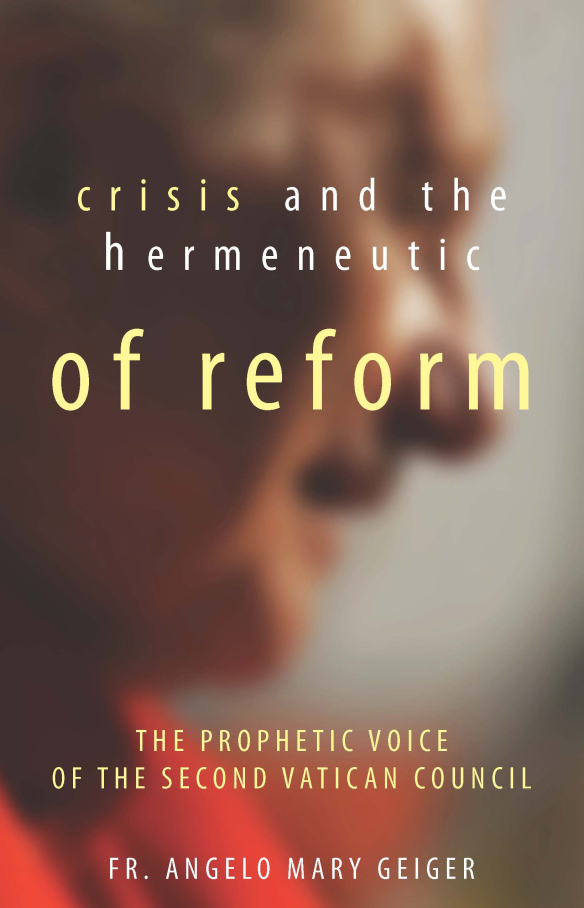Those closely following the saga of the Franciscan Friars of the Immaculate (“FFI”) have undoubtedly noticed – by performing some elementary searches on the net – that one center of the resistance to the growing traditionalist orientation of the friars was right here in Griswold, Connecticut. This, despite the early interest of this priory’s friars in the Traditional liturgy and the much-ballyhooed switch of that community to the Extraordinary Form earlier this year. A closer look reveals that the savage struggle over Tradition within the FFI had commenced much earlier than the oustside world had suspected – indeed, that last year a friar closely associated over the years with Griswold even had prepared for publication an anti-traditionalist magnum opus.
Meet Father Angelo Mary Geiger. Closely involved since at least 1990 in the development of the priory in Griswold, he is widely associated with the group of friars that raised grievances to the Vatican about the use of the Traditional mass in the FFI. These complaints fell upon receptive ears – indeed, according to the very latest news, one of this group has been put into a key management position under the “new order” at the FFI.
In April 2012 Father Geiger trumpeted the imminent publication of his new major work “Crisis and the Hermeneutic of Reform – the Prophetic Voice of the Second Vatican Council” – “soon to be released by the Academy of the Immaculate.” Apparently review copies were made available to such almost forgotten greats of the 1990’s as James Likoudis (The Wanderer) and Msgr. Arthur Calkins, late of the Ecclesia Dei. Their blurbs indicate the content. Likoudis: “With theological discernment he (Geiger) refutes the polemics of modernists, gnostic intellectual elites… and especially ‘traditionalists.’ “ Msgr. Calkins: “What Father Angelo does, however, is to expose the agenda of many of the most avid promoters of the 1962 Missal. In fact not a few of those would really like to retreat to even earlier editions of the Tridentine missal…”
These blurbs and Father Geiger’s own further postings (many attacking the FSSPX) outline this picture: The Church is characterized today by a struggle between modernists on the one hand and traditionalists on the other (apparently equally strong parties). The only solution for the Catholic confronted by these conflicts is blind faith in the Council (the Second Vatican, of course) and blind obedience to the Pope. It is significant that Fr. Geiger identifies this “solution” with “Sentire cum Ecclesia” – since the same language was used in official communications issued after the ”takeover” of the FFI by the Vatican.
In any case it is remarkable that such a major work -authored by an FFI friar no less – would appear as the friars themselves shifted over to more general use of the Extraordinary Form. Especially because this book – despite all protestations and nuancing to the contrary – constitutes a not very subtle attack on the policies of Pope Benedict and of the FFI leadership. Furthermore, how does a friar whose educational attainments are largely confined to study at two Seminaries in the Philippines acquire the time and the capacity to author such a sweeping work – and then blog relentlessly on the topic? I have not found, however, any reference in Fr. Geiger’s posts to the specific situation in the FFI itself. Certainly Fr. Geiger has much more fundamental issues with the Traditional liturgy than the politics of its adoption by the FFI. Those still fantasizing that this is merely an internal FFI issue should read more carefully Fr. Geiger’s blog.
Apparently our author’s superiors also had their doubts about the matter, for later in 2012 Father Geiger found himself the chaplain of a convent of nuns in England. And “Crisis and the Hermeneutic of Reform, ” as far as I am aware, was never published. In a sense it is a pity: one of the first attempts to “analyze” the liturgical situation under Pope Benedict never sees the light of day. For this work is an important historical document – at a minimum it shows that the resistance to the traditional liturgy which had gone underground under Pope Benedict was now (early 2012) boldy resurfacing. Is it not likely though, that under the new order of things at the FFI, where Father Geiger and his friends undoubtedly will be occupying leading posts, we will finally get to see “Crisis and the Hermeneutic of Reform” in all its glory?

Related Articles
2 users responded in this post